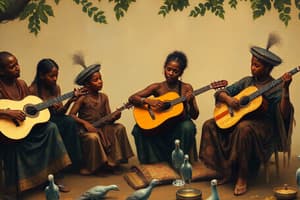Podcast
Questions and Answers
What is one of the key purposes of indigenous songs and ceremonies?
What is one of the key purposes of indigenous songs and ceremonies?
- Preserving traditional knowledge and maintaining cultural identity (correct)
- Spreading rumors and gossip within the community
- Serving as a means of entertainment only
- Promoting modern technology advancements
How do indigenous songs help in transmitting tales and stories within communities?
How do indigenous songs help in transmitting tales and stories within communities?
- By creating fictional stories for entertainment
- By modifying the stories to fit modern trends
- By selling the stories to the highest bidder
- By acting as vehicles for passing down stories from generation to generation (correct)
What role do indigenous ceremonies play in religious beliefs and practices?
What role do indigenous ceremonies play in religious beliefs and practices?
- They have no connection to religious beliefs
- They serve as a means of communication with deities and ancestors (correct)
- They focus solely on historical reenactments
- They are purely for social gatherings
How do individuals feel connected to their ancestral roots through participating in indigenous songs and ceremonies?
How do individuals feel connected to their ancestral roots through participating in indigenous songs and ceremonies?
What is an example of a specific ceremonial occasion mentioned in the text?
What is an example of a specific ceremonial occasion mentioned in the text?
What does the variety of song types found across indigenous societies reflect?
What does the variety of song types found across indigenous societies reflect?
What is a common theme in indigenous songs and ceremonies?
What is a common theme in indigenous songs and ceremonies?
Which type of song is typically sung to express feelings of love or affection?
Which type of song is typically sung to express feelings of love or affection?
What is a common characteristic of war songs?
What is a common characteristic of war songs?
How do indigenous songs reflect interconnectedness with nature?
How do indigenous songs reflect interconnectedness with nature?
What is a distinctive musical instrument used in Huichol ceremonies?
What is a distinctive musical instrument used in Huichol ceremonies?
Which statement best describes the thematic lyrical contents of indigenous songs?
Which statement best describes the thematic lyrical contents of indigenous songs?
Study Notes
Indigenous Songs and Ceremonies
Indigenous music is deeply rooted in cultures around the world, reflecting the diverse histories and traditions of various indigenous peoples. One aspect of this musical heritage involves songs and ceremonies, which serve many purposes within these communities. Here, we delve into the essence of indigenous songs and ceremonies, exploring their significance, forms, and key aspects.
Significance
Songs and ceremonies hold significant cultural, spiritual, and social importance for indigenous societies. They often function as vehicles through which tales from the past are transmitted and stories of creation handed down from generation to generation. These songs and ceremonies also form a vital component of religious beliefs and practices, serving as a means of communication with deities and ancestors.
Moreover, these performances play a crucial role in preserving traditional knowledge and maintaining cultural identity. By participating in them, individuals can gain a sense of belonging to their community and feel connected to their ancestral roots. In some cases, specific ceremonial occasions may be considered an integral part of daily life. For instance, events like the 'the Sun Dance' among the Lakota people in North America, where dancers fast and pray, are highly regarded.
Forms
The variety of song types found across indigenous societies reflects the versatility of human creativity and the adaptability of these customs over time. Some common forms include:
- Hymns: Often sung communally, they express devotion to a god, spirit, or power.
- Love songs: Descriptive lyrics convey feelings of love or affection between lovers, friends, family members, or even divine beings.
- Game songs: These typically accompany games such as stickball, lacrosse, and soccer, providing entertainment during leisure activities.
- War songs: Used to prepare warriors for battle or perform after victory, these are characterized by strong rhythmic patterns and sometimes incorporate animal calls for added effect.
Ceremonies themselves can vary significantly depending on the culture and purpose. They might involve elements such as dancing, feasting, storytelling, art making, or other rituals unique to each group.
Key Aspects
A primary focus of many indigenous songs and ceremonies is the harmonious relationship between the natural world and humanity. This interconnectedness is often reflected in vocalizations mimicking animal sounds, particularly birds and frogs, underscoring the deep bond with nature.
Another key aspect is the incorporation of musical instruments, which differ greatly across different tribes. Examples range from rattles made from gourds filled with grains or small stones, drums of varying sizes used for different functions, and trumpet-like breath whistles called 'tonos' among the Huichol.
Thematic lyrical contents also differ between regions. While some groups might sing about hunting successes or agricultural achievements, others might compose ballads on historical events or current affairs.
In summary, indigenous songs and ceremonies represent more than mere artistic expressions; they embody the collective memory and values of indigenous societies, fostering community cohesion while preserving cultural heritage.
Studying That Suits You
Use AI to generate personalized quizzes and flashcards to suit your learning preferences.
Description
Explore the significance, forms, and key aspects of indigenous songs and ceremonies in this quiz. Delve into the cultural, spiritual, and social importance of these musical traditions, their various forms like hymns, love songs, game songs, and war songs, as well as key elements such as the harmonious relationship with the natural world and diverse musical instruments.




